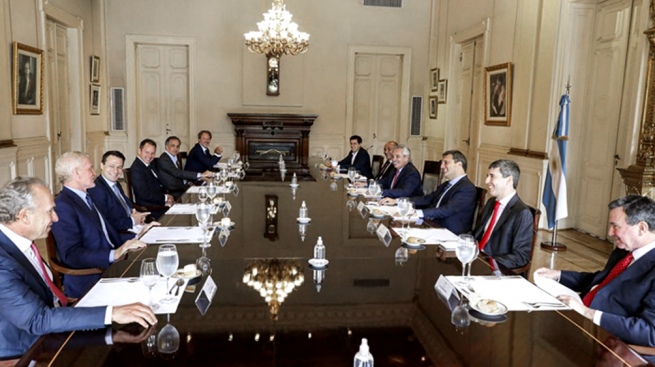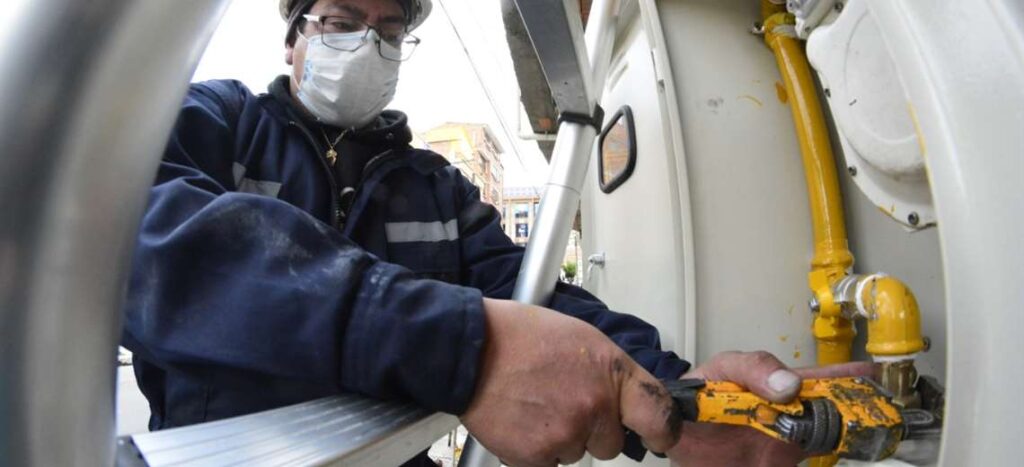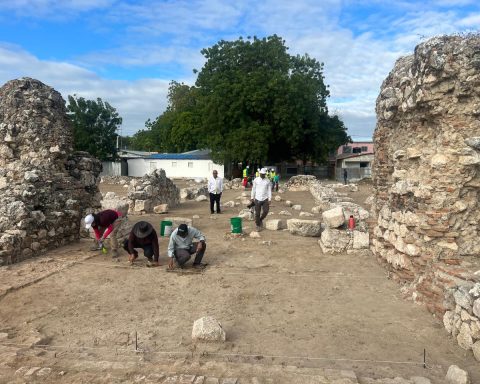The Argentine Business Association (AEA) and the Group of 6 (G6) – which brings together the country’s main business chambers – expressed this afternoon their satisfaction with the agreement reached by the Government with the International Monetary Fund (IMF).
“It means a very important and essential step for the economic and social development of the country,” AEA said in a statement, highlighting the announced understanding.
“Compliance with commitments and access to national and international financing represent decisive factors for the private sector to be able to deploy its full potential in terms of economic growth, job creation and generation of foreign exchange for development,” AEA concluded.

The G6, for its part, expressed its “support for efforts to promote the progress of Argentina and the fulfillment of the commitments assumed, as a tool to achieve the socioeconomic development of the country and an intelligent international insertion”.
“The conclusion of an agreement will be essential to achieve objectives such as strengthening public credit, access to national and international financing for the private sector, job creation, federal development and SMEs, among others,” added the private forum made up of the Association of Argentine Banks, the Stock Exchange, the Argentine Chamber of Construction, the Argentine Chamber of Commerce, the Rural Society and the Argentine Industrial Union.
Metallurgists: “Recognition of the effort made by the National Government”
The Association of Metallurgical Industrialists of the Argentine Republic (Adimra) expressed this Friday its support and appreciation for the Government for having reached what it called a “pre-agreement” with the International Monetary Fund (IMF).
“The metallurgical industrialists grouped in Adimra express their appreciation for the effort made by the National Government to reach this pre-agreement with the IMF,” the entity said in a statement.
The president of the association, Orlando Castellani, stressed the importance of “the axes that were prioritized in this negotiation, based on the need to target the growth of the national economy, avoiding adverse effects on production and in a framework of greater certainty be able to meet our obligations with the international credit organization”.

Came: “An opportunity for growth”
The Argentine Confederation of Medium-Sized Enterprises (CAME) considered “positive” the principle of agreement with the International Monetary Fund (IMF) announced by President Alberto Fernández, and remarked that it constitutes “an opportunity for the growth of the country’s productive sector.”
The head of the entity, Alfredo González, maintained that “the announcement made by the head of state allows us to think of an understanding that does not postpone the real possibilities of small and medium-sized companies.”
“Argentina needed to reach an agreement with the credit organization to achieve a horizon of certainty in the context of a deep economic crisis that the country is going through,” González added in a statement.
Electronic Industries: “Clear the planning horizon for production”
The Argentine Chamber of Electromechanical and Lighting Industries (Cadieel) celebrated the agreement of the national government with the International Monetary Fund (IMF) for the renegotiation of the debt of US$ 44,500 million contracted by the government of Mauricio Macri, and “the benefits that this it will be able to bring to the country and to the national industry”.
“This (agreement) clears the planning horizon for production and economic recovery, which companies in our country need so much,” the chamber that brings together 2,200 SMEs said in a statement.
He argued that “Argentina has the challenge of demonstrating the great potential of our industry. That is why from our chamber we will join forces to contribute to national growth.”
Cereal Exchange: “Recover an inclusive growth model”
The Buenos Aires Cereal Exchange also expressed its satisfaction with the agreement with the International Monetary Fund (IMF) and advocated that this understanding allow the recovery of “an inclusive growth model.”
The entity chaired by José Martins highlighted the agreement with the IMF “in the search for a program of extended facilities to refinance debts and balance the deficit by 2025.”
“It would be important for this type of understanding to allow the necessary policies to be implemented to recover an inclusive growth model based on increased production, growing exports with more added value, and sustainable private investment over time,” he added.

“We must build a macroeconomic framework and public policies that promote productive growth, investment, exports and consumption with clear and predictable rules of the game, a return to international markets and a tax structure that promotes the production and the addition of value,” he concluded.
Trade and Industry: “From now on the country will have greater predictability”
The Federation of Commerce and Industry of the City of Buenos Aires (Fecoba) expressed its satisfaction with the agreement reached by the national government with the International Monetary Fund and pointed out that “the country will now have greater predictability.”
“It has been an important step that we must follow from all sectors to generate a better investment climate in the country,” Fecoba president Fabián Castillo said.
In a statement, the head of the entity said that “SMEs are going through a very difficult situation that, within the framework of this agreement with the Fund, should begin to be reversed through a State that can focus on the Argentine productive sector” .
“This principle of agreement should allow Argentina to support the growth of companies that provide employment and invest in the country,” he said.
Industrial SMEs: “Support the development of productive activity”
The president of Industriales Pymes Argentinos (IPA), Daniel Rosato, endorsed Friday the agreement announced by President Alberto Fernández with the International Monetary Fund (IMF) for the renegotiation of the debt of US$ 44,000 million contracted by the government of Mauricio Macri.
In this sense, he maintained that “the terms of the understanding generate the conditions to support the development of the productive activity of the Argentine factories, initiated with the national reindustrialization model.”
“This agreement, which put aside the old recipes for structural reforms, will allow the growth of an activity that during 2021 showed the capacity to generate wealth for the country, based on industrial SMEs that were rejuvenated and were able to generate employment, as well as production,” Rosato said in a statement.

He affirmed that “this agreement generates predictability, because it allows economic and productive activity to continue to recover,” and stressed that “insertion into the world has as its main condition the opening of markets, which will be guaranteed thanks to the agreement.”
“SMEs need environments that allow us to think in the medium and long term. In the country it was shown that we are in a position to give immediate responses to growth stimuli, but development will come hand in hand with investments and financing. This agreement lays the foundations for a second stage of development in productive matters,” he said.
Argentine banks: “It will help promote development”
The Association of Argentine Banks (Adeba) expressed its recognition and support for the steps taken by the national government to reach an understanding with the International Monetary Fund (IMF) for the US$44 billion debt contracted by the government of Mauricio Macri.
The entity considered in a statement that the agreement “will help promote the development of Argentina and strengthen public credit.”

Javier Bolzico, president of Adeba, stated that “clearing up uncertainty about the country’s ability to meet its commitments is a necessary condition for the private sector to have better access to internal and external financing.”
Cgera: “Generates conditions for the industry to continue recovering”
The General Business Confederation of the Argentine Republic (Cgera) supported the understanding reached between the national government and the International Monetary Fund (IMF) by stating that “it clears the macroeconomic scenario and creates conditions for the industry to continue recovering.”
In a statement, the president of Cgera, Marcelo Fernández, emphasized that “as announced by the Government, the agreement with the IMF does not provide for an adjustment that would affect economic activity and especially in the middle sectors that drive the consumption of the products of SMEs”.
He added that “we thank Minister Martín Guzmán for having highlighted in his presentation that the business sectors collaborate with the agreement by working politically.”
ABA: “Fundamental step forward”
The president of the Association of Banks of Argentina (ABA), Claudio Cesario, said this Friday that the agreement with the IMF “is an important and fundamental step forward to help recompose the deterioration of the macroeconomy.”
“Having reached an understanding on the key points of the future agreement with the IMF and paying the due date this Friday is an important and fundamental step forward to help restore the deterioration of the macroeconomy,” Cesario said.
In a statement, he said that “for the growth of the level of activity, it is essential, in addition to the agreement with the agency, to establish a solid and long-term economic plan that allows all sectors greater predictability, at a time when there are numerous challenges. to resolve, in terms of exports, power generation, creation of private employment, among many others”.
“In that sense, all the actors of society – public and private – should frankly dialogue to define the clear and orderly roadmap that allows us to develop uninterruptedly,” he concluded.
Adefa: “Adequate conditions to promote development”
The Association of Automotive Factories (Adefa) today expressed its “support” for the agreement reached by the Government with the International Monetary Fund (IMF) and maintained that “it provides the necessary predictability to continue working on the process of productive growth.”
In a statement, Adefa explained its “support for the efforts that allow compliance with the commitments assumed by creating the appropriate conditions to promote the socioeconomic development of the country through investment, international integration and the generation of employment, thus promoting the progress of Argentina”.
“For the automotive sector as a whole, reaching an agreement honoring the commitments assumed provides the necessary predictability to continue working on the process of productive growth, the transformation of the industry and promoting the country’s industrial development,” added the business entity .

















